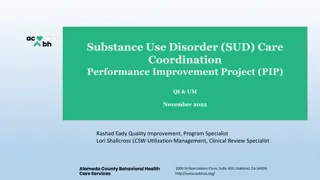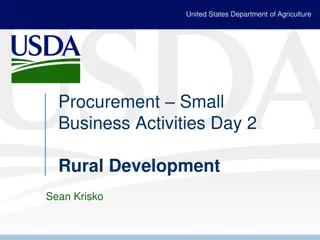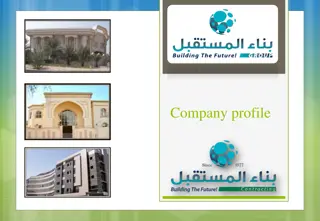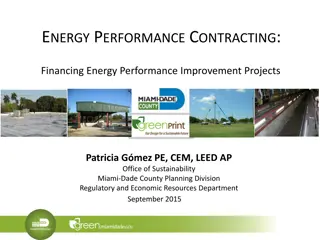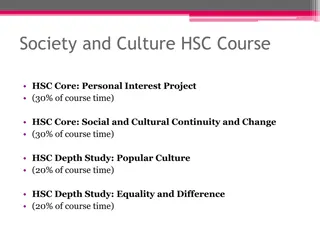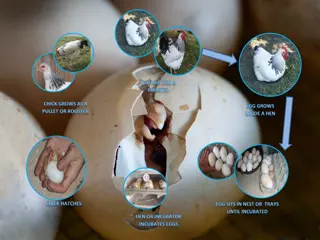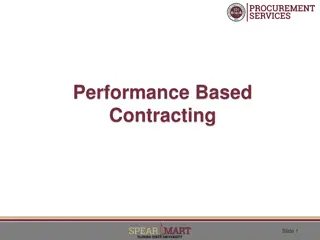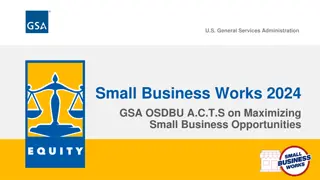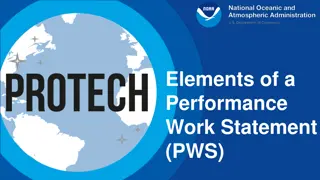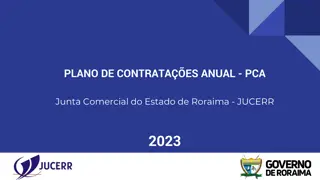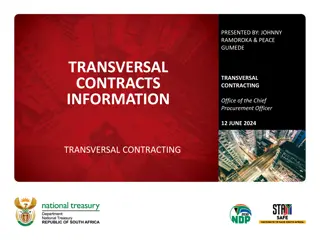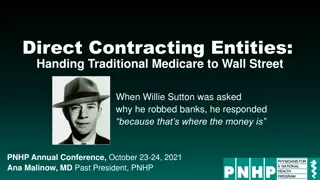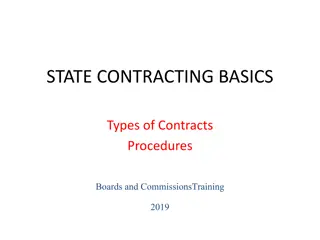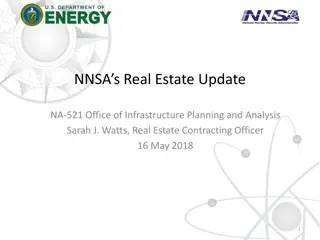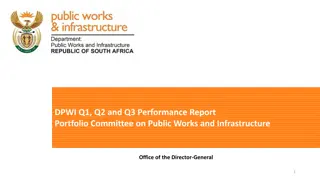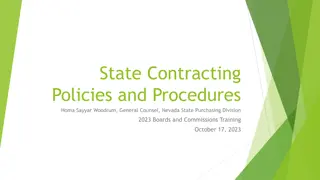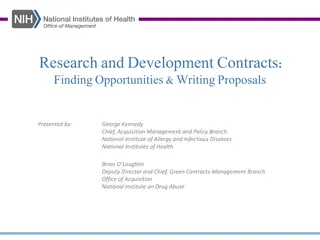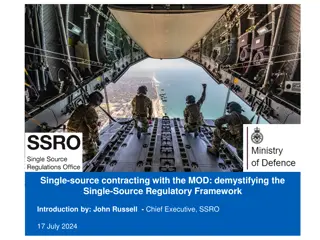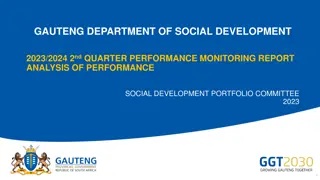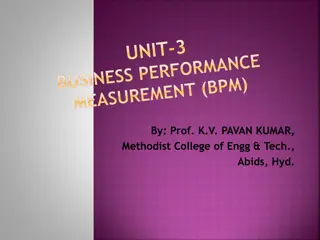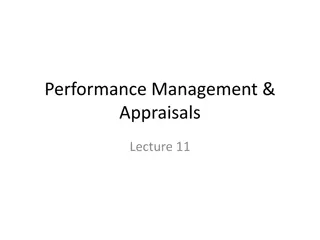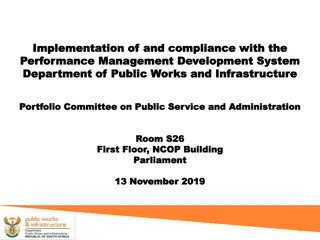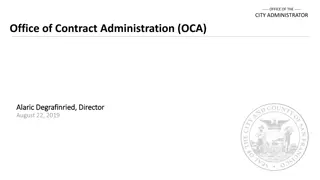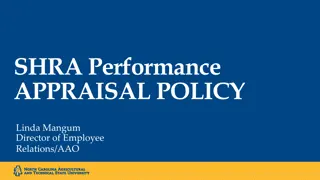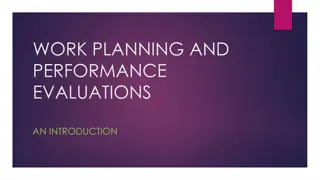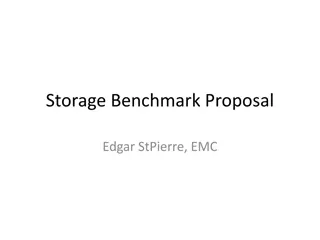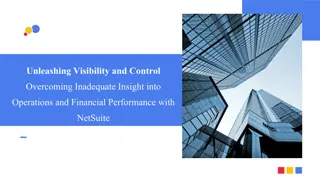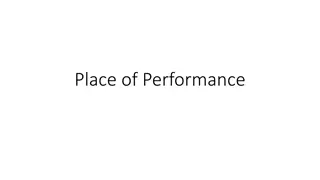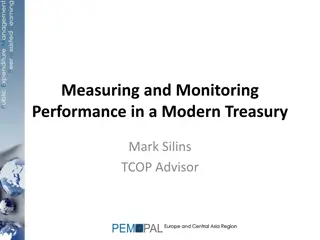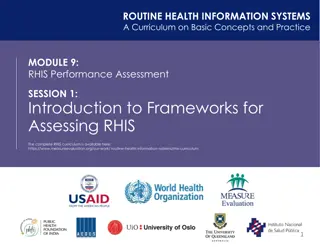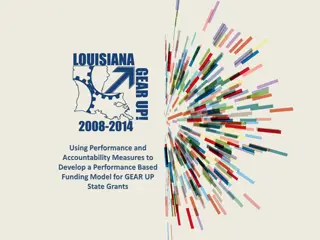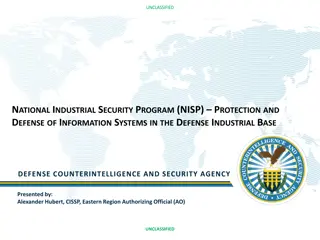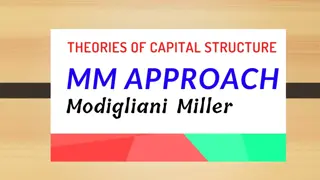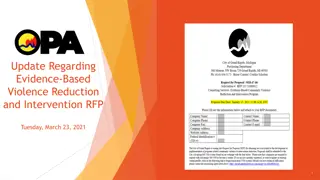Performance-Based Contracting and PIPS Approach
Performance-Based Contracting involves agencies defining problems for contractors to bid on, while the PIPS approach offers benefits like risk identification and mitigation plans, process efficiencies, and profit maximization through supplier expertise. It emphasizes simplicity, accuracy, measurability, and clear communication. Contrasting dominant and non-dominant information, it showcases how industry structures impact vendor selection and risk management strategies in roofing projects. Lastly, it compares price-based and value-based approaches in performance characteristics, highlighting decision-making dynamics and efficiency considerations.
- Performance-Based Contracting
- PIPS Approach
- Risk Mitigation
- Supplier Management
- Value-Based vs Price-Based
Download Presentation

Please find below an Image/Link to download the presentation.
The content on the website is provided AS IS for your information and personal use only. It may not be sold, licensed, or shared on other websites without obtaining consent from the author. Download presentation by click this link. If you encounter any issues during the download, it is possible that the publisher has removed the file from their server.
E N D
Presentation Transcript
Performance-Based Contracting PIPS Performance Information Procurement System
Performance-Based Contracting According to: .com In the performance-based approach, an agency says what problem needs to be solved and allows contractors to make bids detailing their proposed solutions.
What does the PIPS approach offer? Identifies Suppliers who can see the entire project through completion Allows identification of all associated risks and provides for a comprehensive mitigation plan to address each risk Process efficiencies provide win/win environment Shifts contract management supplier to enable profit maximization Suppliers with superior expertise can differentiate themselves Relies on dominant information to minimize decision making
It is simple It is accurate It is measurable It stands out It minimizes decision making It predicts the future outcome It is clearly understandable among all parties It shows the supplier s understanding what are required
vs.Non-Dominant Dominant Non-Dominant Roof material is high performing: Roof material has been installed and is performing: Tensile strength is 800 PSI Elongation is 300 percent Tear strength is 400 lbs Xenon testing: 10,000 hrs 65 customer responses Average roof age: 25 years Percent not leaking: 99% Customer satisfaction: 9.8
Industry Structure High III. Negotiated-Bid II. Value Based Owner selects vendor Negotiates with vendor Vendor performs Best Value (Performance and price measurements) Quality control Performance Contractor minimizes risk I. Price Based IV. Unstable Market Specifications, standards and qualification based Management & Inspection Client minimizes risk Perceived Competition Low High
Performance Characteristics Price based (transaction based) Wrong person talking Decision making on both sides Experts told to not think Buyer tells the vendor what to do and how to do it Best Value (efficient, minimized transactions) Buyer says what he wants Vendors tell buyer what he can get
Problem with Price-Based Systems The State Contractors The lowest possible quality that I want. The highest possible value that you will get. High High Maximum Minimum Low Low
Best Value vs. Low Bid High Low High Low Contractor 1 Contractor 2 Contractor 1 Contractor 2 Contractor 3 Contractor 4 Contractor 3 Contractor 4 Low High Low High
PIPS Approach Identifies suppliers who can see the entire project through completion Focus on what is needed rather than how it will be accomplished Process efficiencies provide win/win environment Allows identification of all associated risks and provides for a comprehensive mitigation plan to address each risk Suppliers with superior expertise can differentiate themselves Shifts contract management supplier to enable profit maximization Relies on dominantinformation to minimize decision making
Project Submittals Two Pages Level of expertise (LE) Claims and verifiable performance metrics No names or marketing materials Two Pages Risk Assessment (RA) Risks and mitigation plan No names or marketing materials Two Pages Value Added (VA) Claims and verifiable performance metrics No names or marketing materials
Project Capability Submittal Claim: Best project manager in company, does only clean room projects, best in the Midwest area. Verifiable performance metrics: 1. Performance history for last 10 years 2. 20 clean room projects completed 3. Average scope $50M 4. Customer satisfaction 9.5 5. Cost deviation .1 percent 6. Time deviation 1 percent
Sample Risk Assessment Risk: Concrete Escalation RA Plan 1 The owner can be assured all risks associated with material escalations will be eliminated because we offer the benefit of an experienced project team that includes the most detailed, prequalified and extensive list of subcontractors and suppliers from around the world. RA Plan 2 The cost of concrete has been rising drastically. Since this project requires a substantial amount of concrete, cost is a risk. To minimize this risk, we have signed a contract with a local concrete manufacturer to prevent any increase in cost during the duration of this project.
Value-Added Submittal Claim: Vendor will track all building major components for the first year including energy consumption, and give client recommendations to extend life of the building. Verifiable performance metrics: 1. Last five buildings, vendor has done this 2. Performance metrics: 9.5 customer satisfaction $40M scope Deviation rate 1 percent Rating on value of documentation 10 percent References and documentation available upon request
Selection Phase Filters and Clarification Phase Filter 3 Prioritize (Identify Best Value) Filter 4 Dominance Check Filter 1 Project Capability Filter 2 Interview Clarification Phase High Criteria Criteria Dominance Check Minimized decision making in selection -Vendor clarifies proposal -Client concerns addressed -Detailed schedule -Risk activities -RMP -Performance metrics -WRR Quality of Vendors -Level of Expertise (LE) -Risk Assessment (RA) -Value Added (VA) -Cost -Schedule -Cost -Interview -LE -RA -VA Award -Best Value is within cost range -BV dominant information is valid Low Time
Performance Information Procurement System Vendor is an expert Vendor is an expert 2 2 CLARIFICATION Weekly Risk Report Vendor is not an expert Filter 1 PC Filter 2 Interview Filter 3 Prioritize Risk Management Plan Quality Control Usage Reports AWARD -Vendor clarifies proposal -Client concerns addressed -Detailed schedule -Risk activities -Risk mitigation plan -Performance metrics -Weekly risk report developed Filter 4 Dominance Check Quality Assurance
Selection Criteria Considering: Pass/fail criteria (required forms) Scored and weighted criteria (level of expertise, risk assessment, value add, interview) Weighted criteria (price) Select potential best value supplier One supplier, the potential best value, will move forward into the clarification phase
The interview of key personnel is the event when the selection committee can get the most dominant information to identify a best value supplier. The interview is different in the following ways: The key person who will do the work is the one who will be interviewed. The interview is searching for an "expert . The interview is non-technical. The interview is searching for an individual who can lead a team. The interview should have the following characteristics: Be as short as possible. A 20 minutes duration is sufficient. The number of questions should be limited to a few questions, and clarifications can be asked if the key personnel do not respond in a dominant fashion.
Interview Objectives Can the individual see into the future? Does the individual know what they are looking for? Does the individual see the project as complex or simple? Is the person quick, concise, very perceptive and polite? Can a project manager quickly identify what to do on a project?
Rating System Two components: Claims Verifiable performance measurements (VPM) to substantiate each claim 10 High performance claim with VPM High/Low performance claim with no VPM If a decision has to be made 5 1 Low performance claim with VPM
Clarification Phase Deliverables Scope of work (what is in and out ) Executive summary of project Detailed project schedule Detailed cost schedule Weekly risk report Risk activities Performance measurements Risk mitigation plan Milestone schedule
Managing Supplier Performance Weekly Risk Reports Performance metrics Usage reports Risk management plan
How cost is controlled while maintaining supplier margins Risks Outside of Supplier Control WEATHER Scope of Project Revised Specifications Assume No External Risk Non-responsive Client
Useful Tips Include any legal exceptions, objections, or additions Include verification sources for claims made in submission No identifying information Weekly risk report is for the clarification phase
QUESTIONS? This publication is issued by the Office of Management and Enterprise Services as authorized by Title 62, Section 34. Copies have not been printed but are available through the agency website. This work is licensed under a Creative Attribution-NonCommercial-NoDerivs 3.0 Unported License.


